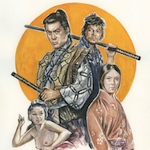 HAUNTED SAMURAI, a.k.a. SHINOBI DEMON: DUEL IN THE WIND, a.k.a. KAZE NO TENGU (1970), is an obscure samurai movie I uncharacteristically blind-bought from Diabolik DVD. It’s apparently never been on video and they made a limited edition blu-ray and I went for it.
HAUNTED SAMURAI, a.k.a. SHINOBI DEMON: DUEL IN THE WIND, a.k.a. KAZE NO TENGU (1970), is an obscure samurai movie I uncharacteristically blind-bought from Diabolik DVD. It’s apparently never been on video and they made a limited edition blu-ray and I went for it.
Diabolik say it’s “based on the works of Goseki Kojima, the artist behind the legendary Lone Wolf and Cub.” Not the writer, Kazuo Koike, who was involved in quite a few movies, but the illustrator, Kojima. According to the film historian commentary track it’s based on a manga he wrote and illustrated, and it sounds like he calls it “Donenke” or something like that, but I could find no information about it anywhere. The opening credits do play over what looks like Kojima’s art.
(Update: It’s called Doninki [土忍記, “Earth Ninja Chronicles”] Thanks Matthew B.!)
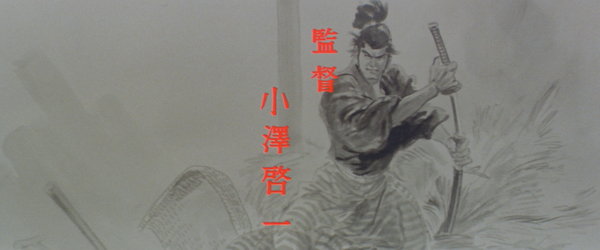
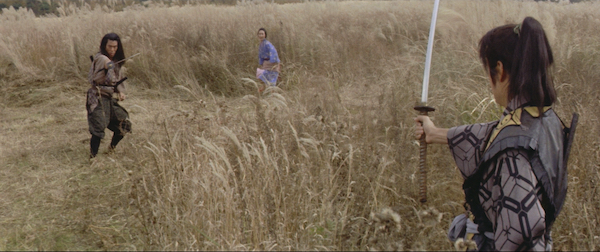
The movie starts with a duel in a wheat field. Rokuheita Kusanagi (Hideki Takahashi, ENTRAILS OF A VIRGIN) does his job and kills a deserter, Gemba (Eiji Go, TOKYO DRIFTER), even though they grew up together and Gemba is in love with Rokuheita’s sister Maki, who’s there watching and begging him not to do it. But the man follows the rules so next thing you know we’re on a beautifully artificial set with Bava-esque yellow-tinted fog, where we learn that crows picked apart Gemba’s body and then Maki hung herself in protest of the system and/or her brother. Damn.
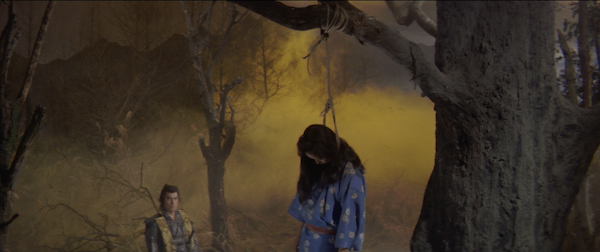
Oh well, back to work I guess. Next the disembodied voice that commands Rokuheita sends him to kill another deserter, Ushizo (Yuji Kodaka), to win favor with the Yagyu Clan. Ushizo tries to deal with it as a human (begging for mercy), then as a ninja (throwing darts and daggers and disappearing into a tree), but neither works. Luckily, the presence of his crying wife and baby seem to remind Rokuheita of his sister, and that finally gets through that thick rib cage of his to his heart. He sheaths his sword and instructs Ushizo to “live as long as you can.”
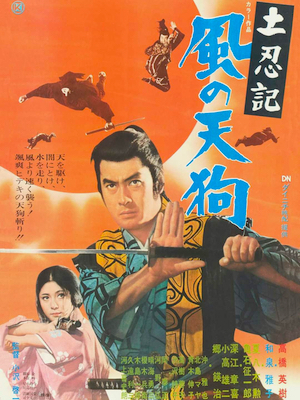 So what do you know? Now Rokuheita’s a deserter too. Even Ushizo seems stunned by it, demanding to know his name I think because, you know, who is this fucking guy who would do this for me?
So what do you know? Now Rokuheita’s a deserter too. Even Ushizo seems stunned by it, demanding to know his name I think because, you know, who is this fucking guy who would do this for me?
So anyway he’s a haunted samurai but not haunted by ghosts. He’s haunted by his past as a bootlicker. Now he’s making it right.
A voice tells Rokuheita “There’s no peace for spies who desert” as he strolls away. And it’s true. For example, he tries to do the correct A-Team thing of traveling around using his skills to help people in need, but his very first person in need is really luring him to a remote island where several female Yagyu ninjas (some topless) try to kill him with arrows, daggers, spears, darts and throwing stars. He tears off his robe and dives into the water, chased by the ladies, for an underwater struggle. Only he (and a whole lot of red water) resurface.
There are a bunch of other people hunting him, including a samurai named Uzuki (Isao Natsuyagi, GOYOKIN) who’s not far behind, trying to kill him because if the Yagyu get to him first it will give them the clout to take over his province. There’s a cool scene where Rokuheita is betrayed inside a shrine and battles ninjas, mostly unseen as their swords poke in through the walls. When he mortally wounds shrine priestess Seiga she pulls off her face to reveal she’s actually a man in impossibly realistic disguise. I always enjoy that gimmick. And good for him that before he bit it he was able to take pride in the good disguise job he had done.
Rokuheita finds a small village “to hide and bury myself,” but there’s another samurai there named Tarao (Seiichiro Kameishi, INVASION OF THE NEPTUNE MEN) who has secrets he’s hiding and worries this new guy is gonna bust him. Tarao’s kind of like the depressing sequel to some other samurai movie: he saved the village from mercenaries in the past, but now they all resent him because he just lays around with his woman while everyone else works hard. Doesn’t contribute at all.
Tarao is different from Rokuheita because he’s not a conscientious objector. He was banished for stealing. Now he’s got something going having to do with secretly panning for gold in the river, which is discovered by four vassals to the governor. When he fights them they realize he’s “too good to be a farmer,” and more trouble comes to town.
So basically we have this world where normal people try to live in peace but they always have to worry about violence and cruelty from soldiers and spies who come into town, as well as from former soldiers and spies living among them. All their problems kinda collide until we have people trying to find and kill Rokuheita, and people trying to get Tarao’s bag of gold dust, while Rokuheita has tenuous partnerships with Tarao and with Uzuki, the guy trying to kill him to help his village. But Rokuheita is the best of the good guys because 1) he realized he was wrong and turned his back on the system at great personal sacrifice 2) he’s trying to help the village grow rice that won’t be taken away from them. (Okay, maybe he’s an anti-tax guy, but in this story they clearly aren’t using it to build the roads.)
Diabolik calls this “the most gory ninja film of its era,” but I would exercise caution if that’s your primary interest. There are a few blood geysers, but it’s nothing shocking. There’s a self-inflicted neck sprinkler, and a cool sequence indicating a close-up eyeball stab. Not like a Fulci movie – it’s quick and you don’t see it go in.
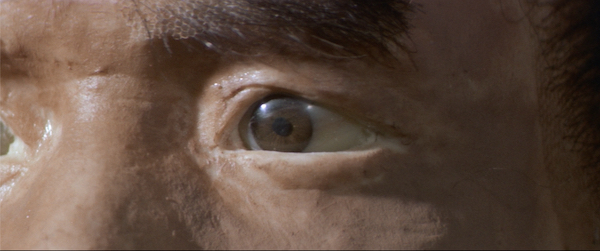
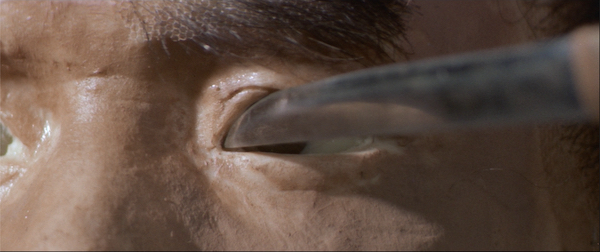
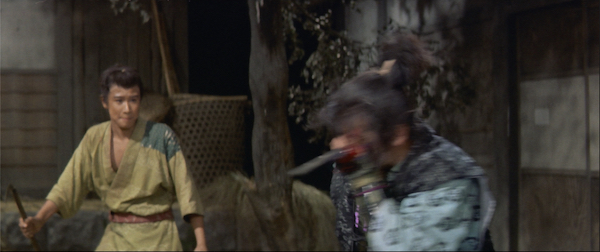
I like the variety of weapons. Lots of styles of bladed weapons, thrown weapons, a couple spinning things, and many of the people working for The Man even have guns (but obviously Rokuheita isn’t a fuckin loser, he uses a sword). There’s some good mayhem and I didn’t quite understand this part but a rat in the rafters gets killed by a blowdart during one of the fights. R.I.P.

The climax reflects the opening, another duel, but this time Rokuheita is the deserter being hunted down by an official. Shots of crows underline that this is a reflection of when he killed Gemba. But something crazy happens – as they advance there’s a solar eclipse. They fight under a dark sky, sparks flying off of their blades. Also an arm flies off one blade. When the sun comes up he puts his sword away. Very dramatic. Imagine how fuckin cool you would feel if you did that!
I enjoyed this one. Director Keiichi Ozawa had previously done the OUTLAW series – GANGSTER VIP 2, GORO THE ASSASSIN, BLACK DAGGER,and KILL!. He continued directing movies and television through 2006.


























December 4th, 2023 at 7:51 am
The original manga is Doninki (土忍記, “Earth Ninja Chronicles”). Searching for those kanji along with Kojima’s name in Japanese (小島剛夕) will turn up some of the art.